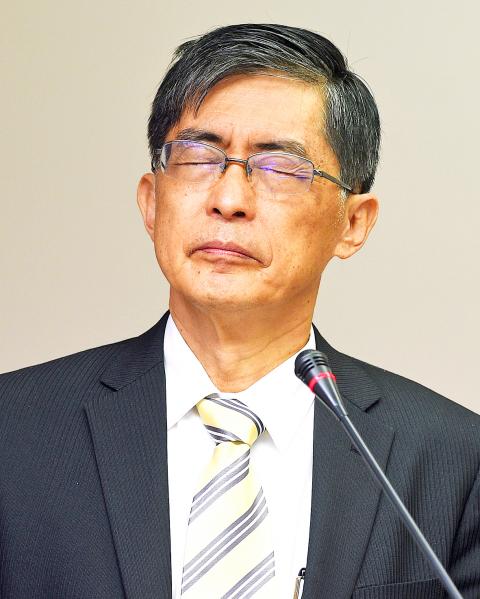A legislative committee session yesterday sputtered into gridlock as legislators and government officials sparred over legal language in proposed amendments to limit air pollution, prompting several legislators to accuse the authorities of being nonchalant about potential health hazards posed by factory emissions.
The session focused on capping factory-emitted PM2.5 — airborne pollutants measuring less than 2.5 micrometers — identified as a carcinogen by the WHO and the International Agency for Research on Cancer.
An amendment proposed by Democratic Progressive Party (DPP) Legislator Lin Shu-fen (林淑芬) said that if the annual concentrations of air pollutants — ozone, PM10 and PM2.5 — gauged in a municipality exceeds the annual standard stipulated by the Environmental Protection Administration (EPA) for three years in a row, that municipality shall be designated a “level 3” air pollution prevention zone, meaning air quality in the region is in breach of emission standards.

Photo: Lo Pei-der, Taipei Times
Furthermore, if a municipality records subpar air quality for five consecutive years, it alone — or together with its neighbors — shall be designated an overall emission control zone, which would prohibit the establishment of new factories unless proprietors obtain emission quotas granted to existing plants by auction or direct trading.
Lin said that air pollutants produced throughout the nation often exceed standards set by the administration, but that there has been no legal tool to hold plants accountable for emissions since the act was introduced in 1999.
An amendment submitted by DPP Legislator Liu Chien-kuo (劉建國) proposes a standard emission inspection system and an emission quota trading system for control zones, and that the systems be introduced after the administration consults with the Ministry of Economic Affairs.
EPA and ministry officials objected to both plans.
Department of Air Quality Protection and Noise Control Director-General Chen Hsien-heng (陳咸亨) said that since the makeup of industrial sectors and their clientele vary, and the pollution reduction technology employed by each firm varies, the proposed rules should not be imposed indiscriminately.
Environmental Protection Administration Minister Wei Kuo-yen (魏國彥) suggested that Lin’s phrasing of “shall” be changed to “may,” in accordance with the wording of the article she intends to amend, saying that it allows for more “flexible” enforcement.
He also said that Liu’s use of the word “consult” should be changed to “convene with” — a sentiment echoed by Ministry of Economic Affairs Deputy Minister Shen Jong-jin (沈榮津).
Chen and Wei’s remarks angered some legislators, who said the officials attempted to stall the introduction of overall emission control zones to protect businesses at the cost of public health, and that their proposed wording aimed at weakening accountability for pollution.
Lin criticized the EPA, saying it “subordinates itself” to the ministry, while DPP Legislator Chao Tien-lin (趙天麟), who chaired the meeting, asked Wei if the administration had “completely abandoned its principles.”
Chao broke up the meeting after announcing that the proposed amendments would be taken to the grand assembly for further discussions. None of the 10 amendments discussed yesterday were passed.

US President Donald Trump yesterday announced sweeping "reciprocal tariffs" on US trading partners, including a 32 percent tax on goods from Taiwan that is set to take effect on Wednesday. At a Rose Garden event, Trump declared a 10 percent baseline tax on imports from all countries, with the White House saying it would take effect on Saturday. Countries with larger trade surpluses with the US would face higher duties beginning on Wednesday, including Taiwan (32 percent), China (34 percent), Japan (24 percent), South Korea (25 percent), Vietnam (46 percent) and Thailand (36 percent). Canada and Mexico, the two largest US trading

ACTION PLAN: Taiwan would expand procurement from the US and encourage more companies to invest in the US to deepen bilateral cooperation, Lai said The government would not impose reciprocal tariffs in retaliation against US levies, President William Lai (賴清德) said yesterday, as he announced five strategies to address the issue, including pledging to increase Taiwanese companies’ investments in the US. Lai has in the past few days met with administrative and national security officials, as well as representatives from various industries, to explore countermeasures after US President Donald Trump on Wednesday last week announced a 32 percent duty on Taiwanese imports. In a video released yesterday evening, Lai said that Taiwan would not retaliate against the US with higher tariffs and Taiwanese companies’ commitments to

‘SPECIAL CHANNEL’: Taipei’s most important tasks are to stabilize industries affected by Trump’s trade tariffs and keep negotiations with Washington open, a source said National Security Council Secretary-General Joseph Wu (吳釗燮) arrived in the US for talks with US President Donald Trump’s administration, a source familiar with the matter said on Friday. Wu was leading a delegation for a meeting known as the “special channel,” the Financial Times reported earlier. It marked Trump’s first use of the channel since returning to the White House on Jan. 20. Citing a source familiar with the matter, the Financial Times reported that Minister of Foreign Affairs Lin Chia-lung (林佳龍) was also a part of the delegation. The visit came days after China concluded war games around Taiwan and amid Trump’s

CHIP EXCEPTION: An official said that an exception for Taiwanese semiconductors would have a limited effect, as most are packaged in third nations before being sold The Executive Yuan yesterday decried US President Donald Trump’s 32 percent tariff on Taiwanese goods announced hours earlier as “unfair,” saying it would lodge a representation with Washington. The Cabinet in a statement described the pledged US tariffs, expected to take effect on Wednesday next week, as “deeply unreasonable” and “highly regrettable.” Cabinet spokeswoman Michelle Lee (李慧芝) said that the government would “lodge a solemn representation” with the US Trade Representative and continue negotiating with Washington to “ensure the interests of our nation and industries.” Trump at a news conference in Washington on Wednesday announced a 10 percent baseline tariff on most goods